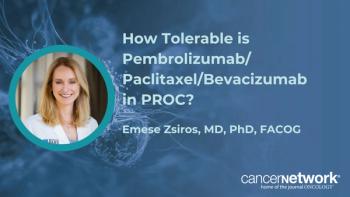
Kevin Kalinsky, MD, MS, on Implications of the Phase 3 RxPONDER Trial in Breast Cancer
The breast medical oncologist and researcher discussed how the addition of chemotherapy to endocrine therapy showed clinical benefit in premenopausal, lymph node-positive, HR-positive, HER2-negative breast cancer.
A study presented at the 2020 San Antonio Breast Cancer Symposium found that menopausal status may determine clinical benefit from the addition of chemotherapy to endocrine therapy in women with hormone receptor (HR)–positive, HER2-negative, lymph node–positive breast cancer and a recurrence score between 0 and 25.
Kevin Kalinsky, MD, MS, acting associate professor in the Department of Hematology and Medical Oncology at Emory University School of Medicine; director of the Glenn Family Breast Center and director of breast medical oncology at Winship Cancer Institute of Emory University, spoke to CancerNetwork about the
Transcription:
So, I think that this study is practice changing. And I think that for the postmenopausal group, when you look at two-thirds of the population, when you look at those curves, they fully overlap. There was a hazard ratio of 0.97 and those curves look exactly the same. And there was no benefit even when we did a forest plot of any subgroups and postmenopausal women who are benefiting from chemo. So, for the postmenopausal group, you know, that spares thousands of women, the cost and the toxicity, and all the other issues that can be associated with getting chemotherapy.
Now in the premenopausal group, there was a statistically significant improvement within invasive disease-free survival and also a 1.3% absolute improvement in survival in the group that were randomized to chemotherapy. So you know, that has huge implications for when we sit down with our patients, and we explain to them, “Well, listen, these are the benefits and these are the risks.” This study helps inform those discussions.
Newsletter
Stay up to date on recent advances in the multidisciplinary approach to cancer.










































